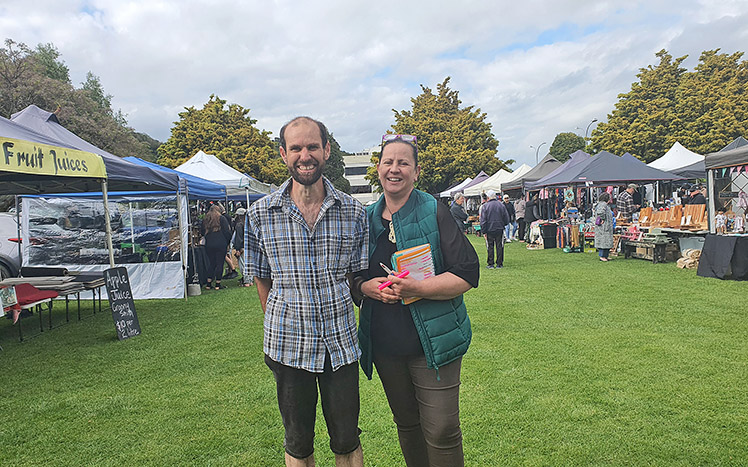Park upgrade could pay for itself – market owner

POSITIVE EFFECTS: The Whakatāne Sunday Market has flourished since 2020, under the ownership of Karl Wheeler and Naomi Biddle.
Diane McCarthy
CRITICS of Whakatāne District Council spending have been scathing of the $450,000 of improvements planned for Mitchell Park, but Whakatāne Sunday Market owners say the benefits will far outweigh the cost.
Naomi Biddle and Karl Wheeler, who took over running the market in 2020, estimate that since the market was established in 2011, the council had received around $90,000 in rent.
Due to increases in rent, $45,000 of that has been in the past four years.
At the current rate, they calculate their rent will pay for the improvements within 25 years.
“That 25 years could be chopped in half if other events used that space - night markets, movie nights; there’s so much potential in that space,” Ms Biddle said.
That was only the beginning of the benefits the market provided, she said.
Since its return to Mitchell Park after Covid-19 saw the Whakatāne War Memorial Centre carpark used as a testing site, the market had gone from strength to strength.
Visitors liked having it in the heart of the central business district and nearby businesses had contacted them to say they benefitted from the extra foot traffic.
“There’s businesses that open their doors on a Sunday now because they get benefits from the market being there,” Ms Biddle said.
“Our focus has always been on the community and giving back.” Ms Biddle said.
She said the market made around $1.5 million a year for stallholders, “a big chunk” of whom were Whakatāne district ratepayers.
“Over 1000 people come to the market every Sunday. That doubles in the summer. There’s about $28,000 to $30,000 a week that is being made.”
A diverse demographic of stallholders includes people trying to earn a little extra on the weekend on top of full-time jobs, small businesses promoting themselves and senior citizens selling handmade crafts.
“We have single mums who bundle their kids up at 6am to come to the market to keep themselves above the breadline, people with disabilities who can’t do 40 hours a week but still want to contribute.
“We have great-grandparents, having to supplement their superannuation to pay their rates, people who have had a terminal illness and are coming to the markets to help pay for their medical costs.”
The market also provides free stalls for schools and community groups and donates money to charitable organisations.
She said positive flow-on effects included at least three stallholders who started their businesses at the market and now rented shops in the township, such as Drip Desserts, L’Atelier and Prana Massage.
“One of our businesses has been able to source products at the market for their shop. There’s so many little gold nuggets that we’ve created over the past four years that when you put them together, it’s huge.”
Planned improvements to Mitchell Park include an accessible toilet, a storage facility, a water tap, power outlets, improved lighting, seating, drainage paths and new signs.
The market owners say they have no intention of moving back to the Rex Morpeth Recreation Hub if a planned shared use space is created there, as one commentator has said they would.
“Mitchell Park was where the market had its origins. We’re here to stay.”
Ms Biddle said the market had no shortage of obstacles, but the biggest at the moment was that Mitchell Park didn’t have a toilet.
“It’s especially difficult for our most vulnerable, like our elderly and our younger generation, both as stallholders and as customers who visited.”
The Boon Street toilets were a long way for some of the older or disabled stallholders who used walkers or walking sticks.
Being out of sight of the market sometimes made it unsafe. She knew of one incident where the 15-year-old daughter of a stall holder had been asked for “sexual favours” there. They were also frequently vandalised and unusable. Human excrement was often found on the floors and people attempted to build fires in them.
“Some of our elderly, when there’s been excrement on the ground, it has gotten on their walkers and sticks. They’re not always in a position to get themselves cleaned up.”
While portaloos were an option, they were not always convenient for disabled people and Ms Biddle said building good disabled access toilets would unlock greater possibilities for the park.
“If we are creating this revenue in the five hours we are there every Sunday, imagine the possibilities when that upgrade happens for people to use that space and create more revenue for the council.”
